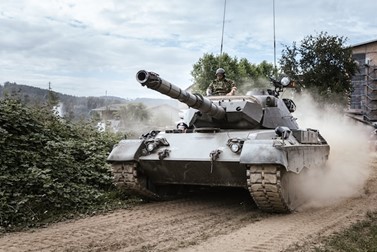David Bellavia of Orleans County is a retired military veteran and Medal of Honor recipient who often reflects on his service experience, encouraging those looking for a purpose to find it within the military. In the following article, David Bellavia discusses the army’s commitment to lifelong learning.
The national security climate is ever-changing, and as geopolitical tensions around the world rise, the United States Army needs to be adaptive, responsive, diverse, and quicker than the enemy. However, soldiers and other professionals in the force must also have the skills and mental health to function outside of their roles. And lifelong learning covers it all.
The army employs many methods to promote its commitment to lifelong learning, but perhaps the most effective are skills-based training programs and ACCESS.
David Bellavia Explains Employing Skills-Based Training as a Method of Lifelong Learning
The Training and Doctrine Command Pamphlet 525-8-2 stated it’s evident that it’s extraordinarily challenging to prepare soldiers for every battlefield occurrence. Thus, both leaders and soldiers must master a few core competencies that offer a foundation for adaptability when the time arises.
To do this, soldiers head to the Army Ordnance School where they develop adaptability, initiative, collaboration, teamwork, problem solving, and critical thinking by partaking in skills-based training (SBT). By practically applying knowledge and skills taught throughout the training in operational situations accelerates soldiers’ journeys of becoming a productive, highly valuable member of their units.
The SBT method utilized by the Army relies on the following three basic “laws” of adult learning theory:
- Experiences and mistakes are the foundations of learning.
- Adults are more interested in learning things that are immediately relevant to their personal or professional life.
- Adults learn best when it’s problem-centered over content-oriented.
David Bellavia says that the Army rightly believes that in basing their learning opportunities in real-world scenarios, they are putting soldiers on the right path to take full ownership of their learning and employ critical thinking to finish tasks in the best possible way.
Transitioning to SBT Proves Positive for Soldiers
SBT hasn’t always been the method chosen by the army to highlight their lifelong learning commitment. However, the shift has proved wholly positive for instructors and soldiers alike.
The approach was introduced in 2020, and involves fewer presentations and more opportunities for collaboration, experimental learning and peer-to-peer instruction.
As for the instructors, they have the chance to utilize technology and adapt lessons for the modern era, with many choosing to implement mobile apps, videos, and simulations to immerse soldiers in the learning journey. Rather than merely presenters, instructors have become facilitators guiding their students to develop critical thinking in an environment centered around problems over content.
Ultimately, this methodology increases confidence and competencies within the Army as well as in day-to-day life. Through SBT, soldiers can even obtain civilian qualifications for employment if they leave the military.
But David Bellavia notes that this isn’t where the commitment to lifelong learning ends.
Offering Continuous Learning Opportunities for Boosted Job Performance and Career Growth

The Army Credentialing and Continuing Education Services for Soldiers (ACCESS) is a directorate of Army University hosting a plethora of programs that promote constant learning.
Soldiers can take advantage of such educational programs thanks to the far-reaching incentives offered by the organization. In recent times, the facility has opened its doors to newly enlisted or soon-to-be-enlisted soldiers, giving more people the gift of education now and in the future.
David Bellavia explains that all the courses foster ACCESS’s main mission — to bolster mission readiness, construct resiliency, and promote lifelong learning. Each has a strong foundation in the myriad of guiding principles, which can be found on The Army University’s ACCESS Vision, Mission and Goals page.
Committing to Lifelong Learning for Soldier’s Wellbeing and Mission Readiness
Lifelong learning may evoke negative feelings related to classrooms and schools, but the reality is largely removed from traditional ways of viewing education. Regardless, some soldiers and officers may deem learning a highly unimportant part of their journey, but the Army is doing all it can to emphasize its imperativeness to such individuals.
David Bellavia explains that the practice presents a range of positive factors which improve the lives of officers and soldiers. Not only do Army-led courses teach participants about the codes of conduct within the military and expectations during missions, but they promote the values upheld by most people in the 21st century for easier integration into civilian life after deployment.
The military is finally following the trend of lifelong learning and those involved are experiencing the drastic, much-needed effects of their efforts.










